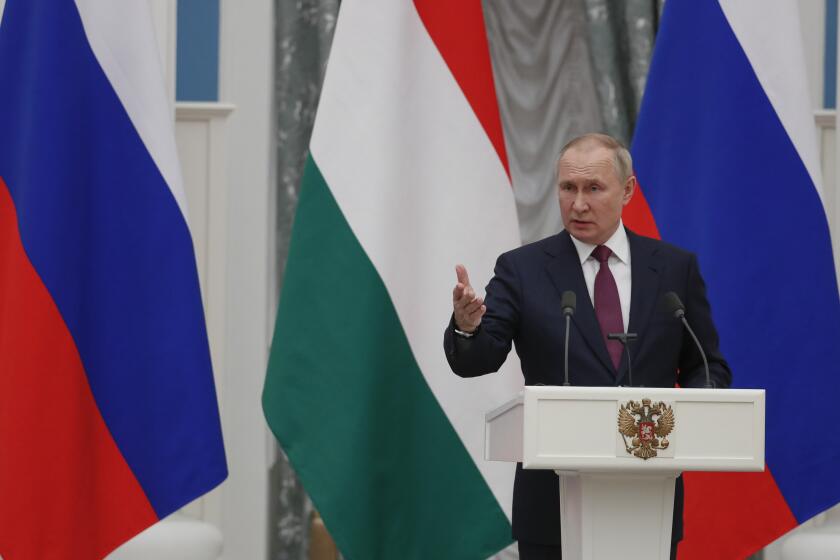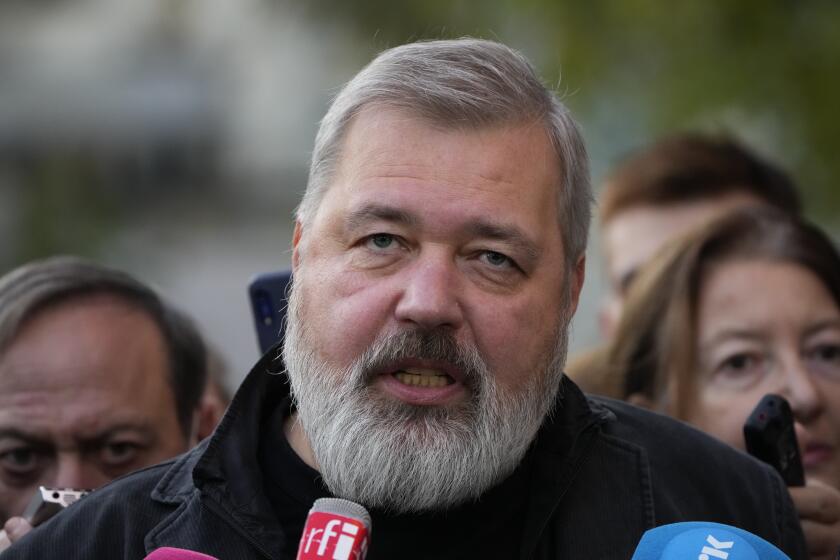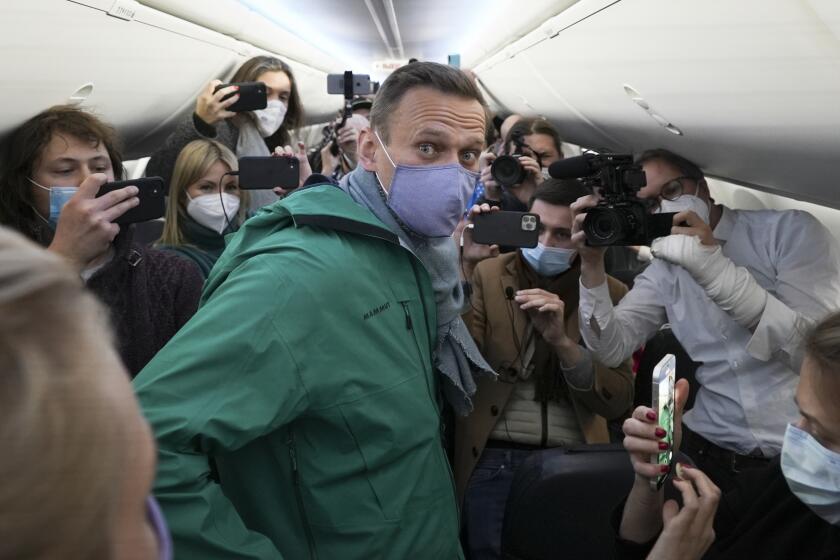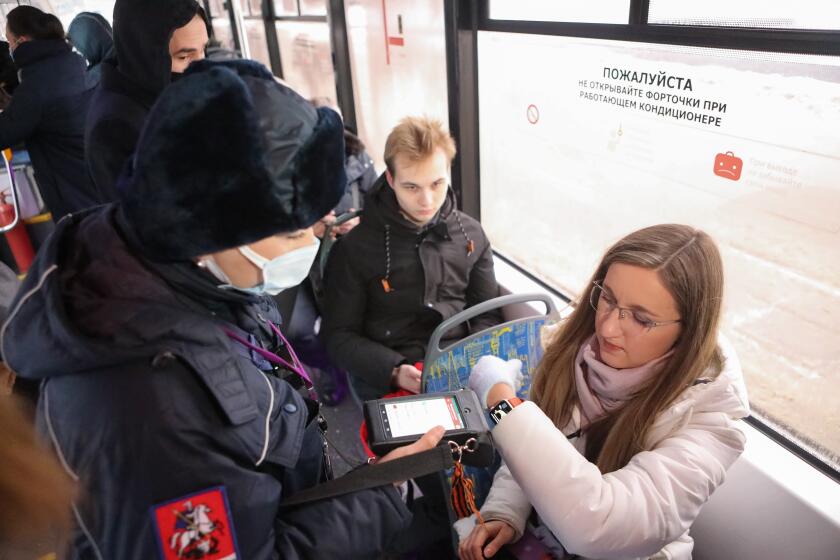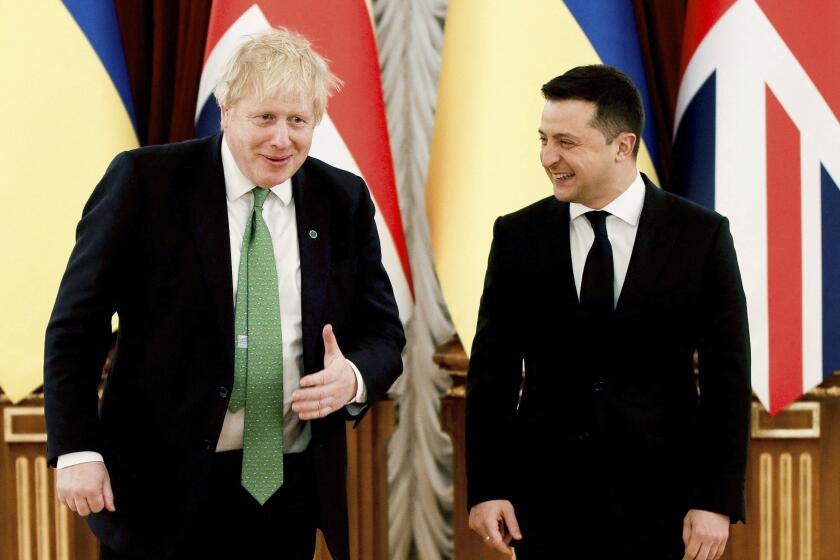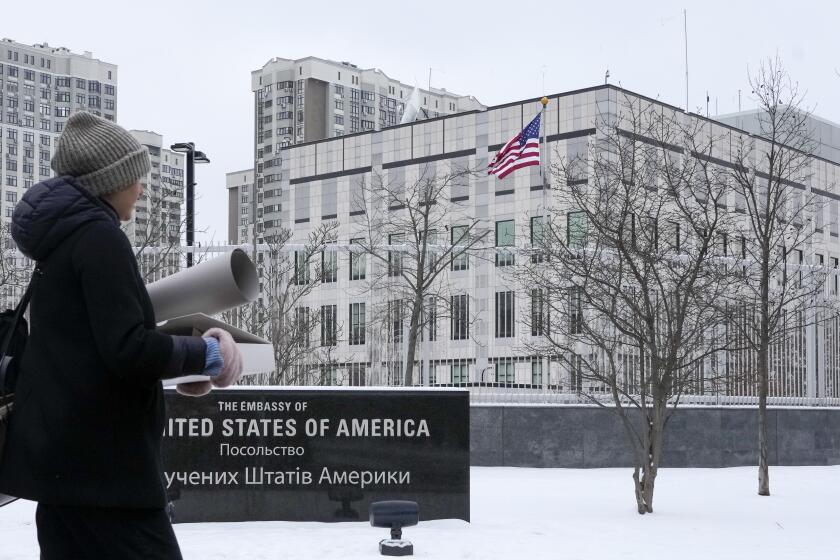Putin’s critics at home are bloodied but unbowed after a harsh yearlong crackdown
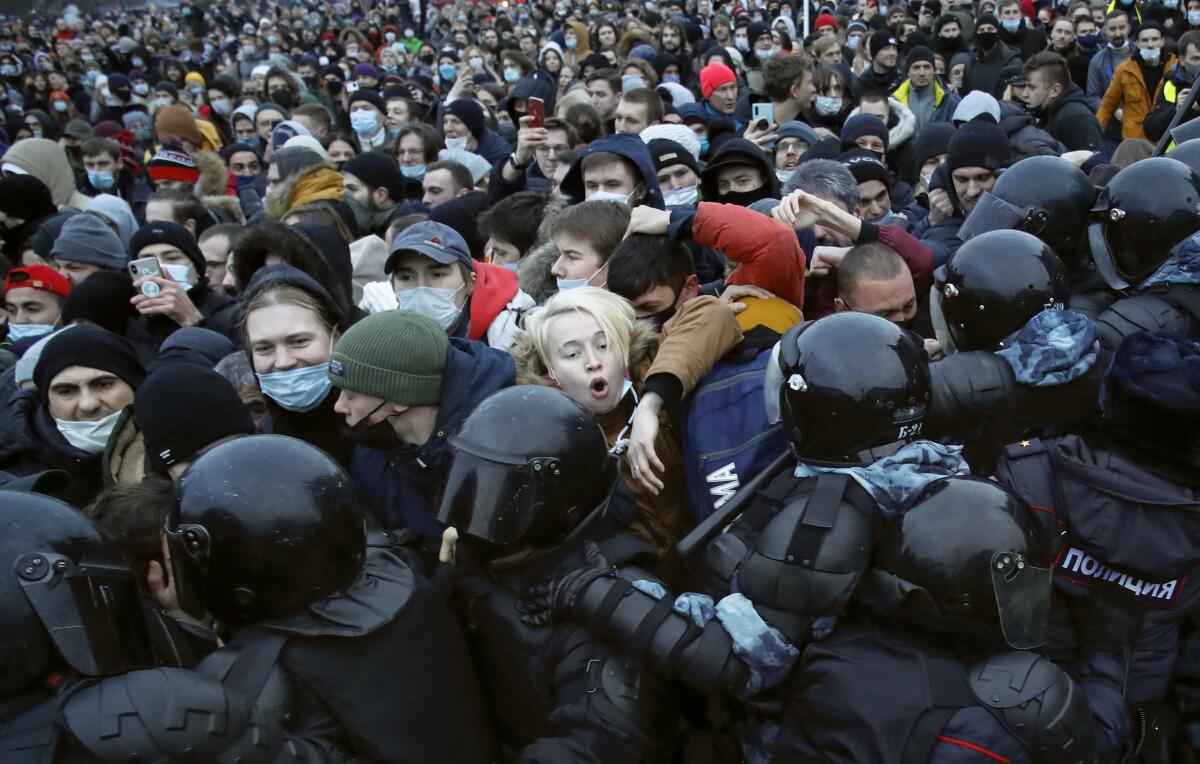
- Share via
MOSCOW — The prison sentence imposed a year ago on leading Kremlin critic Alexei Navalny was a severe blow to Russia’s opposition — and then the situation got worse.
Over the last 12 months, scores of activists, independent journalists and rights advocates were targeted with raids, detained and designated as terrorists and foreign agents.
“Legal opposition politics in Russia ended almost entirely,” said Irina Fatyanova, former head of Navalny’s office in St. Petersburg, who has fled the country.
The setbacks began when Navalny was arrested in January 2021 upon returning from Germany, where he spent five months recovering from a nerve-agent poisoning he blames on the Kremlin. His jailing triggered Russia’s largest wave of protests in years, followed by mass detentions.
Then, on Feb. 2, 2021, a court ordered Navalny to serve 2½ years in prison over parole violations stemming from a 2014 suspended sentence in a fraud case that Navalny says was politically motivated.
The multi-pronged crackdown on dissenting voices was unprecedented in post-Soviet Russia.
In ongoing standoff between Russia and the West over Ukraine, the two sides appear to talk past one another even as diplomatic efforts intensify.
“Repressions have always been used during Putin’s tenure, but they were supplementary” to other efforts that targeted the political process directly, such as elections and propaganda, political analyst Abbas Gallyamov said. “The situation drastically changed last year.”
In recent weeks, the government has again turned up the heat on Navalny and his team, adding him and his associates to the state registry of terrorists and extremists and petitioning to imprison his brother.
Authorities on Tuesday also ordered independent media outlets to take down dozens of stories based on Navalny’s multiple exposures of corruption among government officials.
Kremlin spokesman Dmitry Peskov has insisted that no prosecutions in Russia are politically motivated.
As a new Nobel Peace Prize laureate, Russian newspaper editor Dmitry Muratov has downplayed the buzz around his name.
Initially, Gallyamov said, the pressure on opposition activists and media outlets critical of the Kremlin was turned up because of the September 2021 parliamentary election, which was widely seen as key to Putin’s effort to further consolidate his hold on power.
After the vote went the Kremlin’s way, the authorities saw no reason to stop tightening the screws on dissent. “It’s easy to get the steamroller of repressions rolling. It’s hard to stop it,” Gallymov said.
Navalny’s associates, especially those who announced they were running for parliament, faced a flurry of criminal charges during the period preceding the election.
His closest allies, Ivan Zhdanov and Leonid Volkov, who had left the country, were put on a wanted list in connection with multiple criminal charges. In March, Zhdanov’s father, a former municipal official in Russia’s northern Nenets region, was arrested on abuse-of-office charges widely seen as politically motivated.
Navalny projects supreme confidence that Putin’s authoritarian rule won’t last. Is it denial, theater or truth? Maybe some of each.
Oleg Stepanov, former head of Navalny’s office in Moscow, had to run his campaign for the State Duma from under house arrest after he was charged with violating coronavirus regulations by calling for unauthorized protests over Navalny’s arrest. The case also ensnared Navalny’s brother Oleg, spokeswoman Kira Yarmysh, longtime ally Lyubov Sobol and several other activists.
Stepanov could communicate with the outside world only through his girlfriend and his lawyers. He was eventually barred from the race, as were the vast majority of opposition candidates, and handed parole-like restrictions in the coronavirus-related case.
Sobol, who also sought refuge abroad, counted four criminal cases against her in 2021.
“I was convicted in two criminal cases. Two more were launched against me. I was deemed a member of an extremist group. My team was pushed out of the country, and some two months I spent under house arrest,” she said.
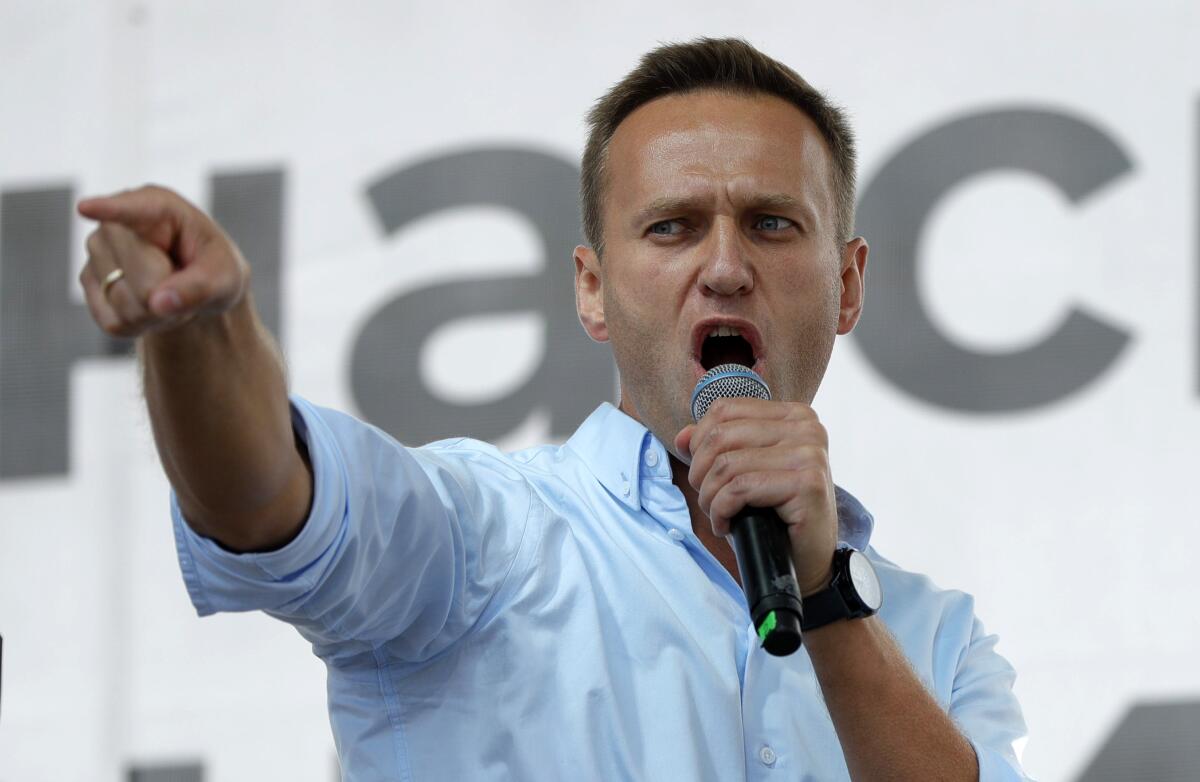
In the most crushing blow to Navalny’s team, authorities outlawed the Foundation for Fighting Corruption and its nearly 40 regional offices across the country in June. Its designation as an extremist organization exposed associates and supporters to prosecution and barred them from running for public office.
Several former coordinators of the regional offices were detained on extremism charges late last year.
Stepanov left Russia after the election to study and hoped to return after getting a degree, but the arrest of one of the regional coordinators made him rethink that.
“I underestimated the risk and left temporarily, but now I understand that it is for an indefinite amount of time,” he said. He was put on a wanted list last week.
News Alerts
Get breaking news, investigations, analysis and more signature journalism from the Los Angeles Times in your inbox.
You may occasionally receive promotional content from the Los Angeles Times.
Other opposition groups suffered similar troubles. Open Russia, financed by Russian tycoon and Putin critic Mikhail Khodorkovsky, disbanded in late May, fearing persecution of its members under a law that bans “undesirable” organizations. Several days after the group ceased to exist, its leader, Andrei Pivovarov, was jailed.
Authorities charged him with running an “undesirable” organization, even though Open Russia had ceased to exist by the time a case against Pivovarov was opened. If convicted, he could spend up to six years in prison.
Tatyana Usmanova, a close ally of Pivovarov and former campaign manager in his run for the State Duma last year, said the scale of the crackdown was hard to anticipate.
But as pressure mounted on Navalny’s organizations, it became clear that the authorities “fear those who can rally hundreds, thousands, tens of thousands of people and coordinate them somehow, direct them at something,” Usmanova said.
Russians are urged to get COVID vaccine boosters as Moscow reported a record 15,987 new coronavirus cases Friday.
The crackdown also extended to dozens of media outlets, individual journalists and rights groups. They were labeled “foreign agents” — a designation that brings excessive government scrutiny and connotations that discredit the recipient. Some were also declared undesirable or accused of ties with undesirable organizations.
Four independent news sites shut down, and at least two rights groups disbanded.
Separately, at the end of 2021, Russia’s Supreme Court shut down Memorial, the country’s oldest and most prominent human rights organization, citing violations of the foreign agents law.
Meduza, Russia’s most popular independent news outlet, which is based in Latvia, was the first in 2021 to receive the “foreign agent” designation. Alexei Kovalev, its investigative editor, said the outlet immediately started losing advertisers and sources.
Putin says the U.S. and its allies have ignored Russia’s top security demands but added he’s still open for more talks with the West.
Like other organizations with the same designation, Meduza was obligated to put a cumbersome 24-word disclaimer in large print disclosing its status as a foreign agent on every piece of content it produces. Omission of the disclaimer might result in crippling fines.
Meduza managed to drum up a hefty crowdfunding campaign among its readers. As the list of “foreign agent” media grew, the designation started to lose its power, Kovalev said.
Advertisers who want to reach “a quality audience” will have to advertise in a “foreign agent” outlet “because there are no longer any non-agents out there,” he said.
Opposition activists refuse to admit defeat. Sobol told the Associated Press that members of Navalny’s team “still make it work,” despite being persecuted and chased out of the country.
The financial options under consideration to punish President Vladimir Putin if Russia invades Ukraine range from the sweeping to the personal.
“We post investigations. We do organizational work and we see a strong support in the Russian society that hasn’t shrunk,” she said.
Usmanova said activists from Open Russia continued their efforts even after the group ceased to exist — some ran in local elections, others campaigned for various causes.
It would be impossible for authorities to stifle all critical voices, especially on the internet and social media and with growing awareness of the country’s dire situation, Usmanova said.
“Even in the Soviet Union,” she said, “they failed to throw all those who dissented into prison and silence them.”
More to Read
Sign up for Essential California
The most important California stories and recommendations in your inbox every morning.
You may occasionally receive promotional content from the Los Angeles Times.
